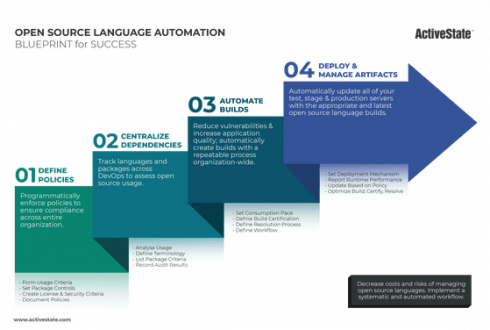
ActiveState has launched a new methodology for implementing open-source language. Its Open-Source Language Automation Blueprint will provide guidelines for decreasing the costs and risks associated with managing open-source languages.
The blueprint is broken down into four phases: defining open-source language policies, centralizing open-source language dependencies, automating open-source language builds, and deploying and managing open-source language artifacts.
More information is available here.
Segment launches Segment Startup Program
Customer data infrastructure provider Segment is trying to help startups start off on the right foot with its new Segment Startup Program. The program is designed to empower customers to access and use data to grow their business. The program offers a free Team Plan that includes more monthly tracked users than the existing Developer Plan and includes unlimited sources and destinations.
According to the company, the program will also include deals from partners like AWS, Google, Mode, Intercom, and Customer.io. In addition, it aims to provide customers with access to resources on topics such as data collection, analytics, and product-market fit.
Google updates its target API level requirements
Google has announced that it is changing its target API level requirements this year. Come August 2019, new apps will need to target API level 28 or higher, and then in November 2019, updates to existing apps will need to target that level of higher.
According to Google, existing apps that do not receive updates are not affected and can still be downloaded from the Play Store.
In addition, new apps will receive warnings during installation if they do not target at least API level 26, and new versions of existing apps will receive that same warning in November 2019. Starting in 2020, the target API level requirement will advance every year.
Google Cloud Services Platform now in beta
Google has launched a beta of its Cloud Services Platform (CSP). According to Google, CSP simplifies the process of building, running, and managing services, and is a less disruptive approach than current hybrid offerings.
“CSP can make your organization more productive with add-on tools that improve the efficiency of your entire IT team: IT operators benefit from a single unified platform to manage applications and services that span multiple environments. Developers gain a secure foundation on which to build scalable, efficient applications based on containers and microservices. Additionally, security teams get consistent tooling to secure their software supply chain and improve run-time security. With CSP we are partnering with our customers to realize their modernization and hybrid goals,” Google wrote in a post.






